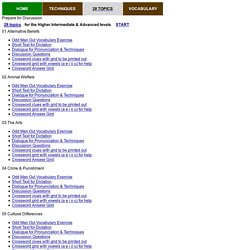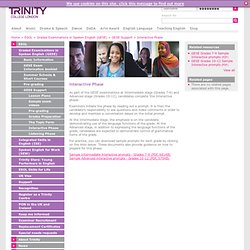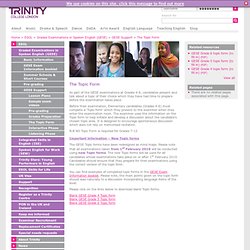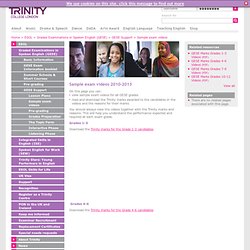

GRADES 4 - 6. GRADES 7 - 9. GRADES 10 - 12. Discussion topics for English language learners. Prepare for Discussion 28 topics-- for the Higher Intermediate & Advanced levels----START 01 Alternative Beliefs 02 Animal Welfare 03 The Arts 04 Crime & Punishment 05 Cultural Differences 06 Economics 07 Education 08 Environment 09 Fashion 10 Food 11 Health 12 Holidays 13 Language Learning 14 Male & Female Roles 15 Marriage 16 The Media 17 Political Systems 18 Religion 19 Rich & Poor World 20 Science & Technology 21 Society 22 Sport 23 Tradition 24 Transport 25 Travel 26 Violence 27 Work 28 Youth & Old Age -----© Ted Power Glossary of Ten Discussion Techniques - detailed index List of the 28 Topics for Discussion [ This list of the 28 topics can be printed out for learners' or teachers' reference ] -- Higher Intermediate vocabulary and discussion - topics 1 to 10: 1. -- Higher Intermediate vocabulary and discussion - topics 11 to 20: 11.

ESL Discussions: English Conversation Questions: Speaking Lesson Activities. Conversation Questions for the ESL/EFL Classroom. If this is your first time here, then read the Teacher's Guide to Using These PagesIf you can think of a good question for any list, please send it to us. Home | Articles | Lessons | Techniques | Questions | Games | Jokes | Things for Teachers | Links | Activities for ESL Students Would you like to help?
If you can think of a good question for any list, please send it to us. If you would like to suggest another topic, please send it and a set of questions to begin the topic. Copyright © 1997-2010 by The Internet TESL Journal Pages from this site should not be put online elsewhere.Permission is not required to link directly to any page on our site as long as you do not trap the page inside a frame.
Readings and listenings by subject areas. The Listening Phase. Interactive Phase - Sample prompts Int/Adv. As part of the GESE examinations at Intermediate stage (Grades 7-9) and Advanced stage (Grades 10-12), candidates complete ‘the Interactive phase’.

Examiners initiate the phase by reading out a prompt. It is then the candidate’s responsibility to ask questions and make comments in order to develop and maintain a conversation based on the initial prompt. The Topic Form - Levels 4-6. As part of the GESE examinations at Grades 4-6, candidates present and talk about a topic of their choice which they have had time to prepare before the examination takes place.

Before their examination, Elementary candidates (Grades 4-6) must complete a ‘Topic form’ which they present to the examiner when they enter the examination room. The examiner uses the information on the Topic form to help initiate and develop a discussion about the candidate’s chosen topic area. It is designed to encourage spontaneous discussion which does not rely on memorised recitation. N.B NO Topic Form is required for Grades 7-12Important information – New Topic forms The GESE Topic forms have been redesigned as mind maps.
You can find examples of completed topic forms in the GESE Exam Information booklet. Grades preparation. GESE Syllabus. GREAT!!! GESE Lesson plans. Authentic communicative skills for real life GESE exams are for people of all ages who want to develop communicative English language speaking and listening skills for use in real life - whatever the purpose, whether for immigration, work, study, leisure or employment.

Genuine discussion format GESE exams are one-to-one, face-to-face assessments of English language speaking and listening skills with a Trinity examiner, who encourages the candidate to show what they can do through prompts and authentic interative dialogue. The exam length is 5-25 minutes depending on the grade. Focus on building confidence Because candidates can plan ahead to discuss their own interests and opinions in the exam, this motivates learning and aids natural speech - which helps them to relax and perform at their best during the exam.
Sample videos 2010-2013. On this page you can: view sample exam videos for all GESE gradesread and download the Trinity marks awarded to the candidates in the videos and the reasons for their marks.

You should always view the videos together with the Trinity marks and reasons. This will help you understand the performance expected and required at each exam grade.